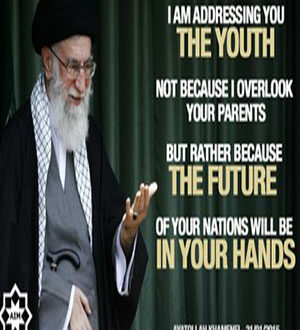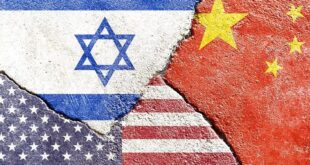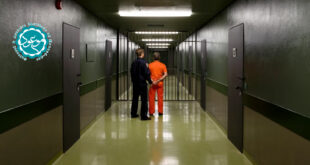At such a time when fear, hatred and prejudices have come to define the dynamics by which communities across the Western world abide by and define themselves in, Ayatollah Ali Khamenei,the Supreme Leader of the Islamic Republic of Iran, and Shia Islam’s most revered cleric, broke his usual media silence to extend a hand of peace, compassion and reason.
A man of intellectual restraint, and an inspiration for millions of Muslims around the world, Ayatollah Khamenei spoke the very words Islam’s faith has carried all along, without ever successfully rising over the deluge of hate radicals have spewed – empathy, tolerance and pluralism.
In his letter, in his words, can be found those principles which Muslims recognise as divine commandments – those precepts which their Scriptures have beseeched humanity to follow, not through the wielding of the sword, but peaceful injunctions.
Sadly Islam, the faith, not the political ideology so many radical clerics have manipulated into a cancer of the mind and the heart, has been too often dismissed, so that only the lies and the hate would rule the narrative.
And while ISIL radicals, those demented souls who pledged themselves to the ascetic and unforgiving dogma of Wahhabism and Salafism (both the expression of theo-fundamentalism), might have convinced many, too many, that Islam stands inherently violent, cruel and bloodthirsty, it is important to remember that it is not Islam which Wahhabis and Salafis clerics are preaching, only their own man-made theo-political devolution.
Regardless of the folly of men, Islam remains beyond those calls for senseless retributions, those vows of wars and terror ISIL commanders have vomited onto their flocks, so that the world would come to know of Muslims only the hate a sick minority adopted as its truth.
But Islam remains alive in the lips of its true clerics, and Islam will continue to live on in the hearts of those for whom the Divine can only be found in reason, restraint, measure, tolerance and acceptance of others’ differences. Islam speaks a truth which is universal and all encompassing since it includes all Scriptures, from the words of Adam, Noah, Abraham, Moses, to those of Jesus and Mohammad.
Islam does not label, ostracize or exclude – Islam knows many denominations and lives in many cultures, traditions, and continents; its language is multitude.
Such was Ayatollah Khamenei’s message to the West – a simple call to dialogue and unity, if not understanding, in the face of a terror which has befallen us all. And though many voices, not least of all that of Western officials, anchored the notion that terror is Islamic in its nature, and therefore to be blamed on all Muslims, it is Muslims who have paid most dearly against the Black Flag army.
Besieged by Daesh (ISIL) hordes, hated by the West for they pray in a fashion which upsets Western sensitivities, Muslims today have been sandwiched in between two radicalism: one secular and one theocratic.
But the real tragedy noted Ayatollah Khamenei lies not in those lives which were cut short by the hands of terror, ALL those lives I must add, but Society’s inability to recognize in its hate, the seed of radicalism itself. “The truth is that if painful matters do not create the grounds for finding solutions and mutual consultation, then the damage caused will be multiplied,” the Imam emphasized.
“The pain of any human being anywhere in the world causes sorrow for a fellow human being,” he added. Those words should be sketched in stone for the world to see: life matters, because in every life stems the source and truth of our humanity and our innate commonality – everything which makes us unique, and at the same time universal.
It is actually this very human paradox which Islam embodies – that oneness can be found in pluralism and not conformity, that unity is forged in the multitude, and that oftentimes balance is rooted in the seemingly chaotic – just as long of course as one recognizes that differences are to be embraced and celebrated, not shun or mocked.
And so Ayatollah Khamenei addressed his thoughts and placed his hopes in those he knows will ultimately decide tomorrow’s fate: the youth. But rather than admonish as a teacher would, the Imam spoke as a father would his child, with kindness and trust.
While my words might fall into deaf ears, I hope scholars’ warnings will carry forth. Society would have indeed fallen quite low if even the words of our brightest minds are abandoned in favour of the screams of an ignorant multitude.
For those who already desire to smite the hand Ayatollah Khamenei extended I would ask this: which concept do you find most insulting to your intellect? Is it the Imam’s calls for peace and solidarity before terror? His injunctions for religious tolerance and invitation to dialogue? Or is it really the faith he speaks on behalf of which turns your pretty little stomach?
Radicalism is not ISIL’s monopoly. Radicalism lives wherever systems will favour profiling and social exclusion over pluralism: whether political or religious.
What will it take for Society to reclaim its humanity, and regain those grounds it already lost to the likes of Wahhabism, ultra-secularism and Salafism?
But here is where Ayatollah Khamenei’s message to the Western youth should ring an alarm in the most atheist of minds. In his words is anchored a universal call for resistance before tyranny, the very principle which has defined, moved and carried Shia Islam since the oath given in Ghadeer Khumm some centuries ago.
If there is a concept which unites Muslims to Western values it is Resistance and the innate understanding that since men were born free they should never be made to kneel.
“I genuinely believe that it is only you youth who by learning the lessons of today’s hardship, have the power to discover new means for building the future and who can be barriers in the misguided path that has brought the west to its current impasse,” Ayatollah Khamenei stressed.
Those are words of hope and knowledge, not hate and blame, only a misplaced pride and a warped sense of entitlement would see here more than a recognition that we owe together to do better, and be better.
 Mouood Mouood English Edition
Mouood Mouood English Edition




